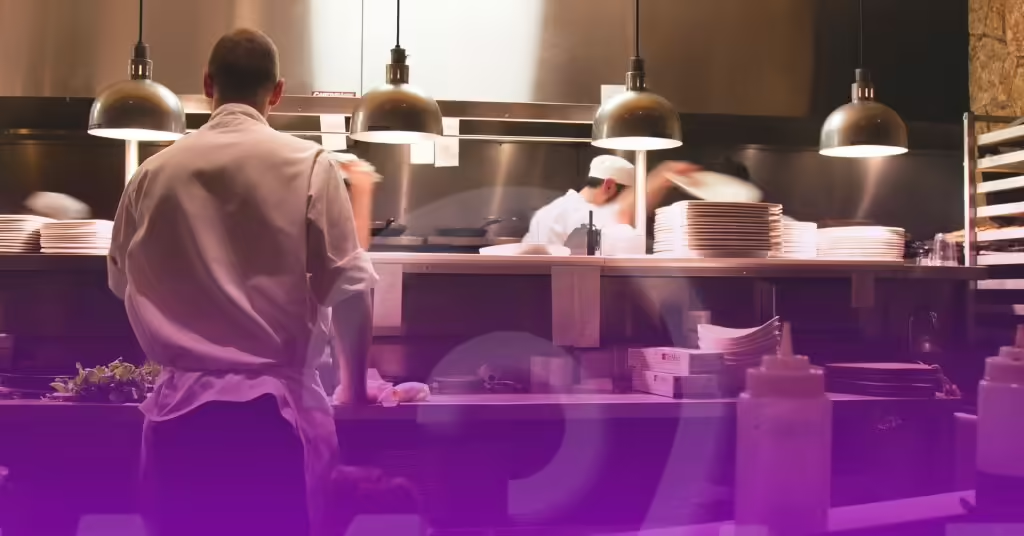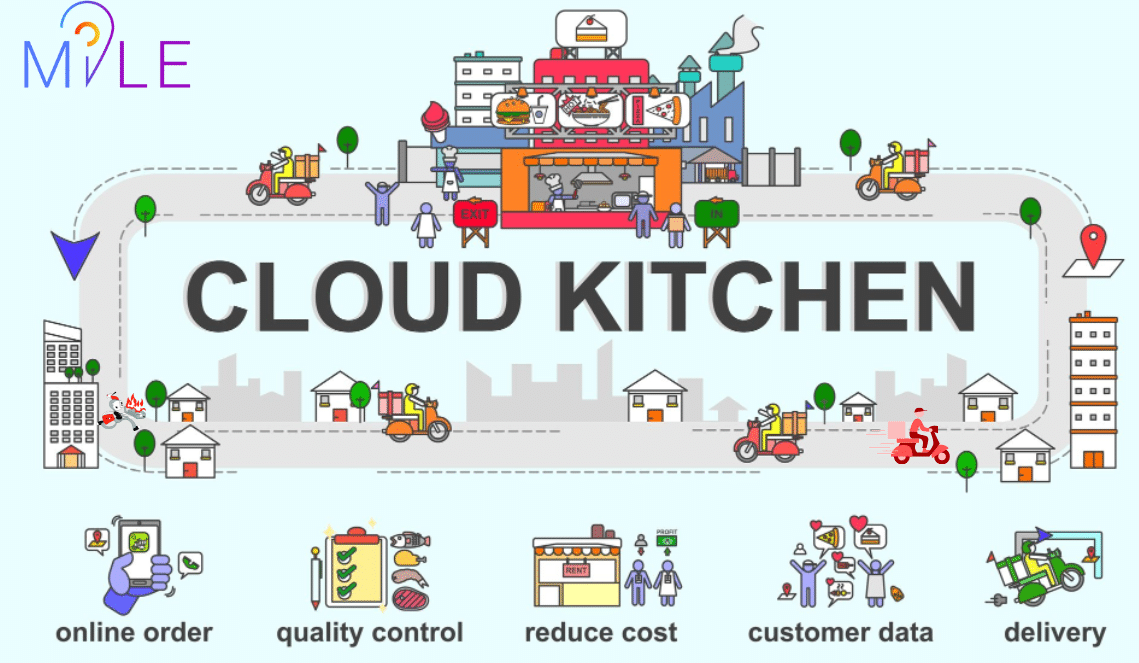
How to Start a Cloud Kitchen in 2024
This article covers the latest F&B trends and a detailed guide on how to start a cloud kitchen. Contact us to build a food delivery app for your business!
We’ve said this before. We’ll say it again. The COVID-19 crisis had a devastating impact on local economies and social structures. But it also set new trends in motion across all industries, primarily as a response to evolving customer expectations, preferences, and lifestyles in a post-pandemic world. The hospitality industry, too, saw some major breakthroughs in terms of the way people experience food.
Latest Trends in Food and Beverage Industry
For starters, consumers are increasingly opting for healthier food choices. Organic, gluten-free, and plant-based diets are no longer just fads; they have become a way of life now. Global chains like Starbucks added oat milk and other non-dairy options to its menu to reflect this shift in consumer preference. Companies like Impossible Foods and Beyond Meat made plant-based meat alternatives mainstream.
The farm-to-table movement, which emphasizes the use of organic, locally sourced ingredients, eco-friendly packaging, zero-waste operations, is also gaining traction. In Dubai particularly, Tom&Serg, Comptoir 102, and The Farm Restaurant are a few eateries known for their focus on sourcing fresh, local produce and building menus around sustainable practices.
There’s a growing interest in cultural gastronomy as well, where the food ingredients, cooking techniques, and dining etiquette express a community’s social customs. Today, diners seek dining experiences that celebrate cultural cuisines and culinary traditions.
Regional restaurant chains are jumping on the international expansion bandwagon to satisfy consumers’ appetite for authentic dining experiences. For instance, Taco Bell’s global presence with over 7,200 restaurants in the US, and more than 1,000 in 30 other countries indicates the rising popularity of Mexican street food worldwide. Tai Er, which specializes in classic Sichuan cuisine and its signature Chinese sauerkraut fish, is another good example. Since 2021, this popular Chinese restaurant has expanded into four Asian countries and the U.S.
In short, the food and beverage sector has changed drastically in the past few years to meet the demands of modern consumers. However, the delivery-only cloud kitchen is one trend that truly disrupted the conventional restaurant dining experience.
Let’s pause here and understand how the cloud kitchen business model works.
What Is a Cloud Kitchen?
Cloud kitchens are food preparation facilities that do not have a physical dining area. Most cloud kitchens run multiple restaurant concepts and serve a wide variety of cuisines from a single location.
Also known as virtual or ghost kitchen, a cloud kitchen operates primarily through online platforms and delivery apps for order fulfillment. Its framework is similar to that of an eCommerce business, but is tailored for the food sector. You order food online, and it is delivered to your doorstep.
Benefits of Cloud Kitchen
Cloud kitchens are a popular choice for food business startups. With fewer overhead expenses and greater operational flexibility, this business model provides entrepreneurs with ample opportunities to explore various culinary ventures. Below are some key benefits of running a cloud kitchen.
Lower Operating Costs
One of the main reasons cloud kitchens are the “in” thing lately is their low operational costs. Conventional restaurants require expensive storefronts, elaborate interiors, and costly renovations, but cloud kitchens don’t. Maintenance and cleaning costs are also much less, as there’s no dining area involved.
Hiring front-of-house staff (like waiters or hosts) is unnecessary, so these businesses hire kitchen staff and delivery personnel only. cutting down salary expenses. Utility bills are also lower because there’s no need for extensive lighting and heating for customer spaces.
With the initial investment thus reduced, entrepreneurs can focus their capital on quality food production, growth hacking, and efficient delivery operations.
Wider Geographic Reach
The fact that cloud kitchens are not dependent on foot traffic gives them a clear competitive edge when it comes to targeting a broader audience. They can reach a wider geographic radius and serve different communities quickly.
Due to their ease of set up, these kitchens can:
- Adjust delivery zones based on customer preferences for certain cuisines.
- Identify high-demand areas and optimize delivery routes accordingly.
- Expand their delivery coverage to target more customers.
Multiple Brands Without Additional Locations
Cloud kitchens allow restaurateurs to manage multiple brands under a single roof. For example, a kitchen offering Mexican food does not have to change its location or extend the existing menu to introduce a new Thai food brand. Thus, compared to traditional restaurants, it’s relatively easier for cloud kitchens to diversify their offerings and maximize profits at a minimal upfront cost.
Operational Efficiency
Cloud kitchens are designed to run efficiently without compromising speed or quality at any time. Their operational agility ensures they:
- Operate around the clock and fulfill customers’ orders, no matter the hour.
- Scale up production seamlessly during busy periods.
- Adjust their processes to accommodate holiday promotions and seasonal events.
Flexible and Easily Updated Menus
Customers are always hungry for new menu items. Cloud kitchens can experiment with new dishes and update their menus frequently based on customer preferences or seasonal ingredients. Contrary to traditional dining restaurants that have to bear the costs of printing new physical menu cards, cloud kitchens can introduce new dishes and keep the customers happy.
Data-Driven Operations
Since cloud kitchens operate entirely from a website or a SaaS platform, they can leverage data analytics to analyze customer behavior, monitor demand fluctuations, identify seasonal trends, and adapt quickly to changes in the market.
Data insights also hep cloud kitchens:
- Take off dishes that receive fewer orders from the menu.
- Introduce in-demand items or ingredients.
- Optimize production schedules to reduce idle time.
- Prevent over-portioning and reduce food waste.
- Run targeted promotional campaigns.
How to Start a Cloud Kitchen: A Step-by-Step Guide
Building a cloud kitchen is exciting, but it’s never simple. If you’re grappling with the question, “What is the best way to start a cloud kitchen?”, don’t worry! This guide covers 12 essential steps to help you set up and manage your cloud kitchen from start to finish.
1. Define Your Target Audience
Identify the types of cuisines in demand within your target market. Study competitors and explore gaps where your cloud kitchen can offer a unique value proposition. Use focus groups or surveys to collect insights into customer expectations and preferences.
2. Design a Menu that Aligns with Your Brand
Create a menu that speaks to your brand identity and caters to your audience’s preferences. Organize cooking demos and food sampling sessions with potential customers. Test out various recipes. Keep the ones that receive the most praise and scrap the rest.
3. Choose the Right Location
Sure, cloud kitchens don’t need fancy storefronts. Still, your location matters for seamless logistics. Ensure your kitchen is situated close to delivery hotspots to reduce delivery times. Opt for affordable spaces like basements, industrial areas, or parking garages to reduce rental costs.
4. Obtain Necessary Licenses
Register your cloud kitchen business with local authorities and obtain the necessary permits. Adhere to food safety standards, health regulations, and legal requirements to maintain compliance and build trust with customers.
5. Recruit the Right Staff
For a cloud kitchen, consistent flavor and quality remains a top priority, even without a dine-in space. Customers expect the same level of freshness and taste they would receive at a traditional restaurant.
Hire chefs that have a demonstrable experience of serving world-class food for different cuisines. When you give your customers the same level of freshness and taste they would receive at a traditional restaurant, you encourage repeat orders, which are important for your cloud kitchen’s long-term growth.
6. Equip Your Kitchen with Essential Appliances
Proper kitchen equipment is necessary for smooth operations. Unlike dine-in restaurants, cloud kitchens require minimal furniture but must have key appliances, such as:
- Exhaust hoods
- Ovens and cooking ranges
- Fire suppression systems
- Refrigerators and freezers
- Commercial fryers
- Preparation counters and sinks
7. Streamline Order Management Workflows
As we mentioned earlier, a cloud kitchen relies on online ordering as its core channel. Your orders can come from multiple sources: food delivery apps, your website, or even phone calls. You need a fully-integrated point-of-sale (POS) system to ensure smooth order management across all platforms.
Moreover, once orders are placed, they need to be processed fast. Many cloud kitchens divide chefs into specialized teams to ensure that every dish has the same taste, appearance, aroma, and texture every time it’s ordered. Customers may also put in special requests for customization in their order or packaging. Invest in a kitchen display system (KDS) and link it to the POS so that the kitchen staff can see all incoming orders and accompanying instructions clearly.
8. Implement Smart Inventory Management
Like in traditional restaurants, tracking inventory consumption is important in a cloud kitchen. Integrate your POS with an inventory management software to monitor stock levels in real-time. You can also automate purchase orders to replenish understocked ingredients faster.
9. Create an Omnichannel Marketing Strategy
A strong marketing plan helps your cloud kitchen gain visibility and attract customers. Use SEO, social media ads, and food marketing strategies to increase reach and engagement. Collaborate with local influencers and food bloggers to generate positive word of mouth.
10. Set Up a Reliable Delivery System
Yes, you don’t require waiters or hosts, but you sure need reliable delivery staff to ensure timely deliveries. Whether you hire an in-house delivery team or outsource the logistics piece to third-party services, ensure clear communication and smooth coordination on all fronts. Keep in mind that efficient delivery logistics is a non-negotiable prerequisite for customer retention.
11. Develop a Mobile App for Orders
A dedicated app will make it easy for your customers to browse menus, place orders, and track deliveries. If building an app isn’t feasible at first, partner with popular food delivery platforms like Deliveroo or Talabat to establish your online presence.
12. Find a Reliable App Development Partner
If you decide to build a custom app, choose an experienced on-demand food delivery app development partner. Make sure the app is compatible with Android and iOS platforms and offers seamless navigation, quick payment options, and order tracking features. An intuitive, user-friendly app will greatly improve your brand image and increase customer loyalty.
Learned how to start a cloud kitchen? Now, let’s move on to developing an on-demand food delivery app for your business. Connect with Mile today and find out how we’ve helped eCommerce entrepreneurs turn their ideas into successful realities.

